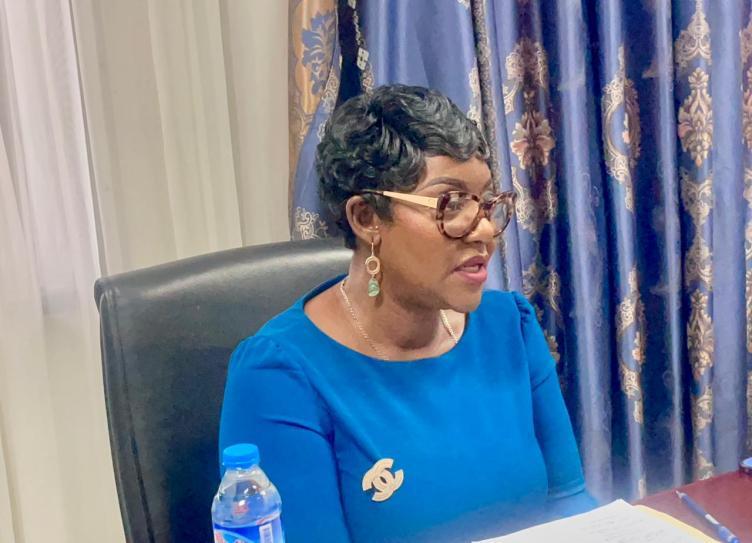Africa-Press – Liberia. The decision to confirm Ms. Sirleaf despite lying under oath has stirred intense national debate and raised new concerns about transparency, integrity and the standards guiding legislative approvals of presidential nominees.
The Liberian Senate on Tuesday, November 18 moved ahead with the confirmation of Fatima Bintu Sirleaf as Deputy Minister for Urban Affairs in the Ministry of Internal Affairs, despite her public admission that she had earlier misled lawmakers about her academic credentials while under oath.
The decision has stirred intense national debate and raised new concerns about transparency, integrity and the standards guiding legislative approvals of presidential nominees.
Madam Sirleaf’s confirmation came nearly a month after her contentious appearance before the Senate Committee on Internal Affairs, Peace, Reconciliation and Local Government, where she had originally declared that she possessed a Master’s Degree in Social Work with emphasis on Mental Health and Substance Abuse and a minor in Urban Development.
That claim immediately became the center of public criticism and legislative scrutiny, particularly after senators questioned whether the academic credential she cited existed at the institution she attended in the United States.
Senator J. Gblehbo Brown of Maryland County, who co-chairs the Committee on Local Government, pressed her on how a professional background rooted in social work and mental health aligned with the technical demands of urban affairs.
He pointed to Liberia’s pressing challenges in urban planning, population growth and social instability, raising doubts about whether her expertise prepared her to guide national urban policies. Madam Sirleaf insisted during that appearance that her training in what she described as urban development equipped her with the capacity to address issues affecting rapidly expanding cities.
She referenced her work in the United States supporting people struggling with addiction and stressed that the same experience could contribute to designing rehabilitation strategies within Liberia’s urban centers.
However, an investigative report published by FrontPage Africa revealed that Kean University, the American institution where Madam Sirleaf earned her degree, does not offer a minor or any program described as Urban Development under its social work curriculum.
This revelation intensified public criticism and heightened the controversy, as the claims had been made during sworn testimony before the Senate. The matter amounted to giving false information under oath, lending it weight under Liberian law that considers such an act a violation of public trust and an offense equivalent to perjury.
Her failure to define the term “government” when questioned during the same hearing also added to the growing skepticism regarding her preparedness for a national leadership position.
The Senate committee postponed its report for several weeks while public pressure mounted. Civil society organizations, political commentators and ordinary citizens called for the Senate to deny her confirmation on moral and procedural grounds. As the days passed, the issue gained traction as a test of the Legislature’s willingness to demand accuracy, honesty and competence from those seeking public office.
It was under these circumstances that Madam Sirleaf reappeared before the Senate committee on Monday, November 17, during which she withdrew her earlier statements, apologized and corrected the record. She explained that she holds a Master’s Degree in Social Work with specialized studies in mental health and substance abuse and urban development.
Critics believe the Senate may have undermined its moral authority by accepting an apology in place of consequences for false sworn testimony, while supporters argue that her clarification should be sufficient to allow her to serve.
She described her claim of having a minor in urban development as an error, stating that her training nonetheless aligns with urban resilience, community development and social systems.
The following day, during the Senate’s regular session, tensions again rose when the committee’s report suddenly appeared on the agenda without having been circulated to senators, a step required under the Senate’s standing rules.
This prompted Grand Kru County Senator Albert Chie to raise procedural objections, noting that no vote should be taken before senators had reviewed the report. Senate Pro Tempore Nyonblee Karnga Lawrence initially upheld the objection and announced a postponement of the confirmation hearing to Thursday.
Before long, however, her position shifted after discussions with a handful of senators, including those who had raised concerns. In an unexpected turn, the Pro Tempore announced that the confirmation would proceed the same day, then withdrew from presiding and left the chamber. Senator Abraham Darius Dillon, Chair of the Senate Committee on Foreign Affairs, took over presiding duties for the vote.
When the matter was finally put to vote, seventeen senators voted in favor of confirming Madam Sirleaf, while only Senator Bill Twehway of Rivercess County opposed the confirmation. He did not immediately provide reasons for his dissenting vote, but political observers have speculated that his decision might be tied to concerns over the nominee’s credibility and the broader implications of accepting inaccurate testimony within the confirmation process.
The vote concluded a day that had begun with strong public expectations that the Senate would take a firm stance on ethical governance. Reports later emerged that a closed-door meeting in the office of the Senate Pro Tempore played a decisive role in softening opposition among a small bloc of senators who had expressed dissatisfaction over the nominee’s earlier statements and the procedural handling of the report. The meeting reportedly lasted several hours and concluded with an agreement to move forward with the confirmation.
The Senate’s decision has since sparked widespread national discourse on the strength of Liberia’s oversight institutions and the standards required for individuals seeking public office.
Critics believe the Senate may have undermined its moral authority by accepting an apology in place of consequences for false sworn testimony, while supporters argue that her clarification should be sufficient to allow her to serve and that her professional background in social systems could still contribute meaningfully to urban development initiatives.
For More News And Analysis About Liberia Follow Africa-Press






